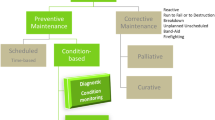Abstract
Modern measurement technology makes it possible to continuously observe and record signals connected with the courses of technological processes, and machinery or devices which take part in these processes. Most often, the signals are supplied to modules which analyse them in order to estimate a set of their features forming the symptoms of the present technical state of the observed object. A particular property of the problems of technical diagnostics is that they are usually related to objects (e.g., machines) of different constructions. It requires a distinction between the forms of databases, and specialisation of rule sets applied within an inference process dealing with the technical state of the object. Additional difficulty is that the history of changes occurring in the observed objects (e.g., modernization) and the history of their maintenance (e.g., repair and control) must be recorded and taken into account in the inference process. The need for applying monitoring and diagnosing devices to complex technical objects is the main reason for research whose goal is to find proper tools for aiding the processes of the design and maintenance of such devices. Interpreting the results of signal analysis is a difficult task. It always requires some kind of experience regardless of the fact that the diagnosing is based on an exhaustive model of the object or on diagnostic rules which are considered to be valid for a determined class of machinery.
Access this chapter
Tax calculation will be finalised at checkout
Purchases are for personal use only
Preview
Unable to display preview. Download preview PDF.
Similar content being viewed by others
References
Avritzer A., Ros J.P. and Weyuker E.J. (1996): Reliability testing of rule-based systems. — IEEE Software, Vol. 13, No. 3, pp. 76–82.
Charniak E. (1991): Bayesian networks without tears. — AI Magazine, Vol. 12, No. 4, pp. 50–63.
Borgelt Ch. and Kruse R. (2002): Graphical Models. Methods for Data Analysis and Mining. — New York: John Wiley & Sons.
Cholewa W. (1985): Aggregation of fuzzy opinions — An axiomatic approach. — Fuzzy Sets and Systems, Vol. 17, pp. 249–258.
Cholewa W. and Kaźmierczak J. (1995): Data Processing and Reasoning in Technical Diagnostics. — Warsaw: Wydawnictwa Naukowo Techniczne, WNT.
Cowell R.G., Dawid A.P., Lauritzen S.L. and Spiegelhalter D.J. (1999): Probabilirsic Networks and Expert Systems. — New York: Springer.
Engelmore R. and Morgan T. (Eds.) (1988): Blackboard Systems. — Wokingham: Addisson-Wesley.
Finke K., Jarke M., Soltysiak R. and Szczurko P. (1996): Testing expert systems in process control. — IEEE Trans. Knowledge and Data Engineering, Vol. 8, No. 3, pp. 403–415.
Haddadi A. (1995): Communication and Cooperation in Agent Systems. — Berlin: Springer.
Hayes-Roth B. (1990): Architectural foundations for real-time performance in intelligent agents. — J. Real Time Systems, Vol. 2, pp. 99–125.
Hayes-Roth B. (1995): An architecture for adaptive intelligent systems. — Artificial Intelligence, Vol. 72, pp. 329–365.
Henrion M., Breese J.S. and Horvitz E.J. (1991): Decision analysis and expert systems. — AI Magazine, Vol. 12, No. 4, pp. 64–91.
Hugin: Hugin Expert Inc., http://www.hugin.dk
Jensen F. V. (2002): Bayesian Networks and Decision Graphs. — New York: Springer.
Kadie C.M., Hovel D. and Horvitz E. (2001): MSBNx: A component-centric toolkit for modeling and inference with Bayesian networks. — Technical Report MSRTR-2001-67, Microsoft Research, Redmond.
KIF: Knowledge Interchange Format, http://logic.stanford.edu/kif/
KQML: University of Maryland Baltimore Country Knowledge Query and Manipulation Language Web, http://www.cs.umbc.edu/kqml/
MIMOSA: http://www.mimosa.org
Moczulski W. (2002): Problems of declarative and procedural knowledge acquisition for machinery diagnostics, In: Methods of Artificial Intelligence (T. Burczyński and W. Cholewa, Eds.). — Computer Assisted Mechanics and Engineering Sciences, Vol. 9, No. 1, pp. 71–86.
Neapolitan R.E. (1990): Probabilistic Reasoning in Expert Systems: Theory and Algorithms. — New York: John Wiley & Sons.
Norsys: Norsys Software Corp, http://www.norsys.com
Pearl J. (1988): Probabilistic Reasoning in Intelligent Systems: Networks of Plausible Inference. — San Mateo, CA: Morgan Kaufmann.
Schema: Schema Net. http://www.schema.net
Shortliffe E.H. (1976): Computer-Based Medical Consultation MYCIN. — New York: American Elsevier.
Singh M.P. (1994): Multiagent Systems. — Berlin: Springer.
Spiegelhalter D.J., Dawid A.P., Lauritzen S.L. and Cowell R.G. (1993): Bayesian analysis in expert systems. — Statistical Science, Vol. 8, No. 3, pp. 219–283.
W3C, World Wide Web Consortium, http://www.w3.org/
Author information
Authors and Affiliations
Editor information
Editors and Affiliations
Rights and permissions
Copyright information
© 2004 Springer-Verlag Berlin Heidelberg
About this chapter
Cite this chapter
Cholewa, W. (2004). Expert Systems in Technical Diagnostics. In: Korbicz, J., Kowalczuk, Z., Kościelny, J.M., Cholewa, W. (eds) Fault Diagnosis. Springer, Berlin, Heidelberg. https://doi.org/10.1007/978-3-642-18615-8_15
Download citation
DOI: https://doi.org/10.1007/978-3-642-18615-8_15
Publisher Name: Springer, Berlin, Heidelberg
Print ISBN: 978-3-642-62199-4
Online ISBN: 978-3-642-18615-8
eBook Packages: Springer Book Archive




